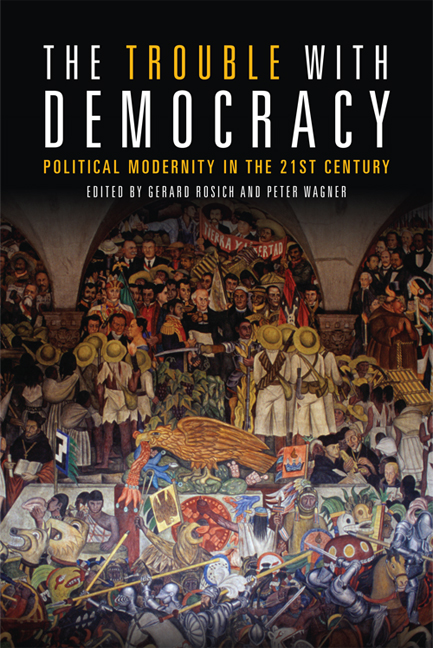Book contents
- Frontmatter
- Contents
- Acknowledgements
- List of Contributors
- 1 Introduction: Re-Interpreting Democracy for Our Time
- 2 Autonomy in and between Polities: Democracy and the Need for Collective Political Selves
- 3 Rethinking ‘Modern’ Democracy: Political Modernity and Constituent Power
- 4 Democratic Surplus and Democracy-in-Failing: On Ancient and Modern Self-Cancellation of Democracy
- 5 Setbacks of Women's Emancipation (Condition, Consequence, Measure and Ruse)
- 6 Political Modernity, Democracy and State–Society Relations in Latin America: A New Socio-Historical Problématique?
- 7 Communitarian Cosmopolitanism: Argentina's Recuperated Factories, Neoliberal Globalisation and Democratic Citizenship. An Arendtian Perspective
- 8 Middle-Classing in Roodepoort: Unexpected Sites of Post-Apartheid ‘Community’
- 9 Democracy and Capitalism in Europe, Brazil and South Africa
- 10 From Realism to Activism: A Critique of Resignation in Political Theory
- 11 The World as We Find It: A Suggestion for a Democratic Theory for Our Times
- 12 Epilogue: Democracy as Capacity for Self-Transformation
- Index
3 - Rethinking ‘Modern’ Democracy: Political Modernity and Constituent Power
Published online by Cambridge University Press: 05 September 2016
- Frontmatter
- Contents
- Acknowledgements
- List of Contributors
- 1 Introduction: Re-Interpreting Democracy for Our Time
- 2 Autonomy in and between Polities: Democracy and the Need for Collective Political Selves
- 3 Rethinking ‘Modern’ Democracy: Political Modernity and Constituent Power
- 4 Democratic Surplus and Democracy-in-Failing: On Ancient and Modern Self-Cancellation of Democracy
- 5 Setbacks of Women's Emancipation (Condition, Consequence, Measure and Ruse)
- 6 Political Modernity, Democracy and State–Society Relations in Latin America: A New Socio-Historical Problématique?
- 7 Communitarian Cosmopolitanism: Argentina's Recuperated Factories, Neoliberal Globalisation and Democratic Citizenship. An Arendtian Perspective
- 8 Middle-Classing in Roodepoort: Unexpected Sites of Post-Apartheid ‘Community’
- 9 Democracy and Capitalism in Europe, Brazil and South Africa
- 10 From Realism to Activism: A Critique of Resignation in Political Theory
- 11 The World as We Find It: A Suggestion for a Democratic Theory for Our Times
- 12 Epilogue: Democracy as Capacity for Self-Transformation
- Index
Summary
La Souveraineté est du tout inseparable de l’État […] La souveraineté est la forme qui donne l’être à l’État.
Charles LoyseauPolitics is the art of associating men for the purpose of establishing, cultivating, and conserving social life among them. Whence it is called symbiotics.
Johannes AlthusiusIt is commonly assumed that the democratic passage to political modernity coincides with a transfer of sovereignty from the king to the people, from the One to the Many. According to this canonical and highly influential view, the historical birth of modern democracy occurs during the two great eighteenth-century revolutions in North America and France, whereby sovereign power was subtracted from monarchy and illicitly seized by its subjects to be relocated in the people as the ultimate foundation of the newly erected constitutional ‘sister’ republics. By appropriating the king's supreme prerogatives, the people wore his sovereign mantle, sat on his vacant throne, and replaced him as the highest legitimate authority. In this passage, democratic sovereignty marks a reversal that turns upside down the sources of political authority without, however, breaking away from the monarchical paradigm. Thus, with the modern advent of democracy, sovereignty changed hands but essentially it remained the same.
This dominant narrative has some far-reaching historical, theoretical, political and normative implications. Let me briefly mention the most important, which I will address in the following sections of this chapter.
To begin with, democratic modernity is understood in terms of the regal paradigm of power. The conceptual and political structure of popular sovereignty indicates the historical continuity of monarchical rule and its quantitative extension. As Judith Shklar succinctly put it, ‘The word sovereignty has scarcely any meaning at all apart from absolute monarchy.’ One can speak of modern democracy as a post-monarchical regime in so far as the abolition of kingship does not entail the elimination of monarchical sovereignty as such but only the replacement of one carrier/subject of supreme power with another. With popular sovereignty, power changes hands but its essence and logic remain intact.
- Type
- Chapter
- Information
- The Trouble with DemocracyPolitical Modernity in the 21st Century, pp. 50 - 89Publisher: Edinburgh University PressPrint publication year: 2016



